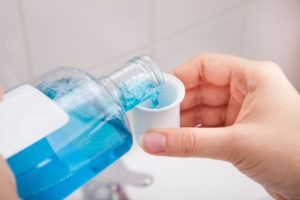
Mouthwash seems like a magical fix all. If you are too tired or lazy to brush your teeth, mouthwash can be a quick fix. After all, it is easy, tastes good, and leaves you with fresh breath — but is mouthwash good or bad for you? Some say good because it can help fight plaque and gum disease, and others say bad because they believe it can cause cancer. First of all, all mouthwashes are not the same. No two mouthwash products deliver the exact same results. Mouthwashes do offer clear benefits. Let us examine more about the pros and cons of mouthwash.
What Types of Mouthwash Are There?
Mouthwash is often referred to as an oral rinse or mouth rinse. The liquid is meant to be swished or gargled in the mouth. Most mouthwash brands are classified as an antiseptic mouthwash. Mouthwash is not intended to replace brushing or flossing and there are some pros and cons to using it.
There are basically two types of mouthwashes: therapeutic and cosmetic. Therapeutic mouthwashes have special active ingredients. Additives such as eucalyptol, menthol, methyl salicylate, and thymol, that have known gum health properties. These ingredients also kill bacteria and reduce the presence of bad breath.
Alcohol is often added, not to kill bacteria but rather to act as a carrier agent of active ingredients. Alcohol is a known risk factor for oral cancer, which has raised concerns over alcohol’s use in mouthwash among dental professionals. Fluoride is also commonly added to therapeutic mouthwashes, due to the mineral’s ability to harden enamel.
Cosmetic mouthwashes primarily work to reduce the prominence of bad breath while leaving a pleasant taste in the user’s mouth. Unlike therapeutic mouthwashes, cosmetic rinses are not intended to reduce your risk of developing gum disease or cavities.
Most therapeutic mouthwashes are available over-the-counter but a few require a prescription. We recommend that patients only use mouthwashes that carry the American Dental Association Seal of Acceptance. The seal signifies that the product has been tested and shown to be effective and safe.
The Good, the Bad, and the Ugly of Mouthwash
It is easy to focus on the good things when assessing the pros and cons of mouthwash but let’s break it down.
Mouthwash Pros (Good)
- Helps fight cavities: Studies show that mouthwash that contains fluoride can help reduce cavities and remineralize tooth enamel.
- Certain mouthwashes will help fight periodontal disease: The use of an antibacterial mouthwash that contains chlorhexidine or alcohol may help prevent gingivitis and periodontal disease.
- Helps prevent low birth weight babies: Periodontal disease has been deemed a risk factor for preterm pregnancies. According to a study published in the American Journal of Obstetrics and Gynecology, pregnant women who used mouthwash during pregnancy were less likely to deliver early.
- Freshens breath: Both therapeutic and cosmetic mouthwash can temporarily cover up the source of foul breath. Unless there are active ingredients, the wash is really just masking bad breath.
- Whitens teeth: Although not a strong whitening agent, many patients find some improvement in color. Only a good cleaning will remove stains.
- Reaches more of your mouth: Brushing only reaches 25 percent of the total surface area of your mouth. Using mouthwash allows individuals to clean their whole mouth.
Mouthwash Cons (Bad)
- Does not eliminate bad breath: Bad breath due to poor oral hygiene is only masked with the use of mouthwash. It’s the same as using perfume during the Renaissance period in France to mask body odor due to their lack of bathing.
- Not a replacement for brushing and flossing: While some people believe that a quick swig of mouthwash can substitute for brushing, no form of mouthwash can remove or prevent tartar buildup.
- Irritates canker sores: If you experience frequent bouts of canker sores, you should know that mouthwashes that contain a high alcohol content that can irritate canker sores. For those sensitive to canker sores or if you have a dry mouth, search for alcohol free versions. There are some prescriptive versions that will soothe canker sores.
Excessive Use (Ugly)
Oral cancer: Although it has yet to be proven, it has been suggested since the 1970s that mouthwash may contribute to the development of oral cancers. Chronic exposure to alcohol increases cancer risks.
Tips for Becoming an “Expert” mouth rinser
Whether you swish or gargle, there are important steps to be followed when properly using mouthwash.
- Pour around four teaspoons of mouth wash into a cup.
- Pour the contents of the liquid into your mouth without diluting it.
- Swish or gargle the contents of the cup in your mouth for 30 seconds.
Learn more about the Pros And Cons of Mouthwash
A good daily mouthwash regimen should be coupled with brushing and flossing to obtain optimal oral health results. Aside from providing dependable general and restorative dentistry services to our community, Dr. James Fondriest also holds respected academic appointments at the Pankey Institute in Key Biscayne, FL, and the Spear Institute in Scottsdale, AZ, and he is a former adjunct Associate Professor in the Department of Prosthodontics at the University of Florida Dental School.
To schedule a consultation, call our office today at (847) 234-0517.
